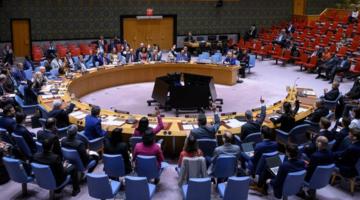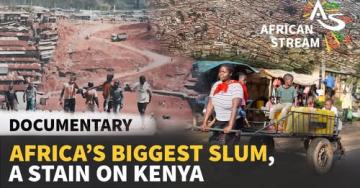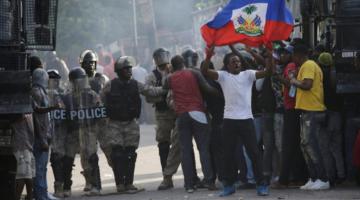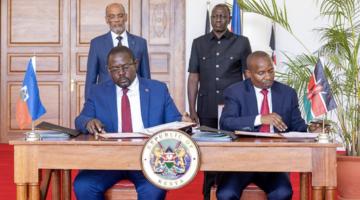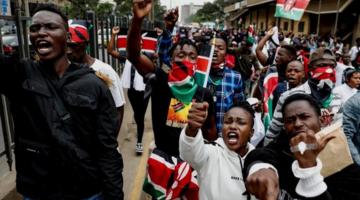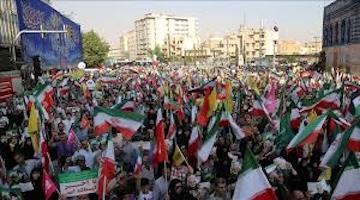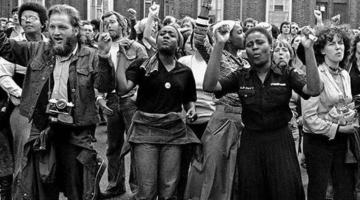Ngũgĩ wa Thiong'o reminds us that the primary contradiction in Africa is imperialism and its meek comprador bourgeoisie enforcers.
What is up with Kenya? In the last few months, we’ve seen the Kenya government volunteer to lead the military occupation of Haiti while the Kenyan Parliament have prohibited the wearing of “traditional” African garb, even as Kenyan judges and jurists still wear those wooly white “periwigs” that are the garish and sweaty sartorial holdovers of colonial Britain. Kenya’s President William Ruto is going around the world offering up “Africa” to more foreign exploitation, while attempting to privatize at least 35 state-owned companies. Ruto has claimed Kenya’s role in that intervention and occupation represents a form of pan-Africanism. If pan-Africanism stands for anti-Blackness and means shucking and jiving for US imperialism, then he is certainly right. But the truth is, Ruto’s claims are, to put it bluntly, bullshit.
Ruto himself has positioned himself to be a decent candidate for the International Uncle Tom of the Year Award, with a special mention for Best Neocolonial Coon award. Did the visit to Kenya of that crusty cracker Chuck, the so-called “King of England,” generate some late colonial desire in Ruto’s tremulous, fluttering breast — or did his slavish loyalty to the West come from a few transfers from a CIA slush fund into a Swiss account? Otherwise, how could the country that was so important to the history of Pan-Africanism, that gave us the righteous Land and Freedom Party, that birthed one our most important novelists, playwrights, and theorists of culture, colonialism, and decolonization in Ngũgĩ wa Thiong'o, become such an embarrassing, toxic, and destructive presence on the global Black stage?
As for Ngũgĩ, we need him more than ever. The essays collected in his Decolonizing the Mind: The Politics of African Literature remain as important now as when they were first published in 1986, offering a key to the insidious work of European colonialism on African consciousness. Below, we publish a short, 1982 essay from Ngũgĩ titled “National Identity and Foreign Domination” that was published in the UNESCO Courier in 1982. Ngũgĩ asserts that the primary contradiction, the “real crisis of culture in Africa is still the imperialist domination of our economy, politics, and culture.” He also argues that imperialism in Africa works through the neocolonial “native bourgeoisie.” Ruto proves Ngũgĩ’s point. Until Kenyans (and other African neocolonies) get rid of this comprador bourgeoisie that keeps them under imperial domination, they will never be free. We will never be free.
National identity and foreign domination
Ngũgĩ wa Thiong'o
The crisis of culture in the developing world has too often been seen in terms of tradition and modernity, the rural and the urban, and the conflict of cultures consequently engenders by that dichotomy. In this schema, the urban (industry, technology, electronics) is identified with modernity, the rural (subsistence agriculture, economic backwardness) with tradition.
But ironically, the same modernity is supposed to evoke images of fast changes, instability, and human isolation, while tradition evokes contrary images of peace, stability, and communal existence. Rampant urbanization and industrialization are seen as destroying a harmony of values embodied in tradition whose repository is the rural community. Thus the false glitter of the electronic culture is seen as luring an unwary youth away from the stability of a communal life in a rural village into the chaos and loneliness of life in the big city.
It is all there in written literature. The peasant who follows the mirage of prosperity and happiness in the big city only to find the opposite is a familiar character in many a novel from the developing world. What often is not stated is that such a character is actually escaping from the hell of rural poverty and misery, in both cases brought about by ruthless exploitation. But even where this is stated, the schema of rural urban dichotomy as the basis of analysis of the problems of culture in developing countries remains, and the crisis of culture is still seen in terms of a conflict between tradition and modernity.
Two misleading assumptions underlie the schema. Modern industry, science and technology are seen as being opposed to tradition and peasant cultures. The destruction of traction or aspects of tradition and peasant culture is seen as necessarily evil. The beauty of rural culture must rest on a foundation of poverty and abject want. But surely modern science and technology, depending on their organization, ownership and control, now make possible a total economic transformation of the countryside and thus the erection of a whole people’s culture on a structure of prosperity instead of backwardness.
Moreover, far from destroying tradition, modern technology (e.g. Video, Cinema, Television, Radio) makes possible a reclamation of the positive aspects of tradition and peasant cultures. Africa for instance has a rich tradition of oral literature. Take the tale, for instance. The oral narrative was often accompanied by mime and song. With video, film, or television, it is now possible to reclaim this tradition through an integration of the visual (e.g. animated cartoons) and the verbal (i.e. the voice telling the tale and the accompanying music).
The same is true in theatre. African peasant theatre relied heavily on song, dance and mime, and these can now be permanently captured on the screen. Thus not only is it possible to democratize access to this heritage — more people can be told the tale at the same time—but even more crucial, it is possible to integrate the national cultures within the geographic State.
The other assumption is that the rural and the urban are two self-contained islands and a character who walks from one to the other is actually journeying across two unlinked entities. But the two are a creation of each other. The urban is a creation of the rural as much as the rural is a creation of the urban. The peasantry had to be alienated from the soil and be driven into towns, that is, they had to be proletarianized before the modern city could be born. But where under feudal and semi-feudal systems, the town was under the sway of the countryside, the modern city which emerged with capitalism, the city of gold, became the master of the rural of which it had been born and bred.
“The bourgeoisie,” Marx wrote of nineteenth-century Europe, “has subjected the country to the rule of the towns. It has created enormous cities, has greatly increased the urban population as compared with the rural, and has thus rescued a considerable part of the population from the idiocy of rural life. Just as it has made the country dependent on the towns, so it has made barbarian and semi-barbarian countries dependent on the civilized ones, nations of peasants on nations of bourgeois, the East on the West.”
With the evolution of capitalism into the higher stage of imperialism, the rural and urban sectors of the nations of peasants became even more subjects to the rule of the nations of bourgeoisie, and with what results: the subject nations— the majority of the population—were now reduced to the idiocy of the new urban and rural life.
This subjection of the nations of peasants to the nations of bourgeoisie is the heart of the matter when discussing problems of the developing countries—economic, political, or cultural.
But by posing the problems of culture in the developing world in terms of a conflict between modernity and tradition, between the rural and the urban, thus concentrating on secondary contradictions, we are avoiding the real issues behind the crisis. What are the real forces behind modernity and tradition, the urban and the rural? We have, in other words, to see the whole problem (modernity, tradition, rural, urban) in a historical perspective.
This would reveal to us that the major contradiction in the Third World is between national identity and imperialist domination. The developing world with its economic, political and cultural backwardness, its massive poverty, illiteracy and disease, is a creation of imperialism in its colonial and neocolonial stages. The developing world can in fact be defined as all those countries in Asia, Africa and Latin America which have been and continue to be dominated by Western imperialist nations. This in essence means the economic, political and cultural subjection of the whole population of the dominated countries to the ruling bourgeois classes of the dominating nations.
“The bourgeoisie,” wrote Marx and Engels, “by the rapid development of all instruments and production, by the immensely facilitated means of communication, draws all, even the most barbarian, nations into civilization. The cheap prices of its commodities are the heavy artillery with which it batters down all Chinese walls, with which it forces the barbarian’s intensely obstinate hatred of foreigners to capitulate. It compels all nations, on pain of extinction, to adopt the bourgeois mode of production; it compels them to introduce what it calls civilization into their midst, to become bourgeois themselves. In a word, it creates a world after its own image.”
A world after its own image: this it tried to achieve not only through economic exploitation and political subjugation but more importantly, through cultural domination.
But the process created its opposite: the economic, political and cultural struggle for national independence and total liberation. In the colonies and neo-colonies, there in fact emerged two cultures in mortal conflict: foreign imperialist cultures and national patriotic cultures. Thus there emerged, out of the different nationalities often inhabiting one geographic State, a people’s literature, music, dance, theatre, art, in fierce struggle against foreign literature, theatre, music, art imposed on colonies, semi-colonies and Neo-colonies.
This to me is still the real and fundamental conflict of cultures: a national patriotic culture in struggle against foreign imperialist cultures. Other contradictions, between the urban and the rural, between the different nationalities, are secondary and can only be properly appreciated within the context of the larger, basic contradiction.
In this war of cultures, the people try to find their roots in the patriotic traditions of
their culture mostly kept alive by the peasantry in their songs, poems, theatre and dances. The foreign imperialist culture tries to find a stronghold in the cities masquerading under notions of modernity and progress.
This is not an accident. The native bourgeoisie through which imperialism works in the colonies and neo-colonies dwells in the city. Very often it controls the State instruments of copersuasion and propaganda. In their State-controlled theatres, cinemas, T.V. stations, radio, they only allow foreign programmes, while in the education system they advocate the use of foreign languages, and the study of foreign literature only. The impoverished, exploited peasantry dwells in the countryside. That is why the struggle between national and foreign cultures appears on the surface as a conflict between the rural and the urban, or between tradition and modernity.
But what is really modern is the new national cultures emerging out of the struggle for total liberation, a culture rooted in the patriotic and heroic traditions of the people. This is better seen in the resistance poetry and songs and theatre among workers in the urban areas of the developing world. It is a fighting culture, a resistance culture, and though fusing different elements, it is in basic harmony with the resistance culture of the countryside. The urban and the rural struggles find this harmony in their opposition to both foreign imperialist exploitation and domination and internal exploitation and oppression. The urban worker and the rural peasant are the basis and creators of truly national cultures in the developing world.
What then is the crisis of culture in Africa and in the developing world as a whole?
The real crisis of culture in Africa is still the imperialist domination of our economy, politics and culture - no country can consider itself free as long as its economy and culture are dominated by foreigners.
A pre-requisite of Africa's cultural development is therefore a continued struggle for its economic and political liberation from all vestiges of imperialism. This also means a continued struggle against the comprador ruling class through whom imperialism continues to dominate the lives of millions of peasants and workers of the developing world.
A new world economic and political order would mean a new world cultural order and this would see the flowering of a great modern culture in Africa and the rest of the developing world, a culture that has roots in the dynamic progressive aspects of a national tradition while remaining open to the progressive and humanist cultural element all over the world.
Ngũgĩ wa Thiong'o, “National identity and foreign domination,” Unesco Courier (July 1982).


